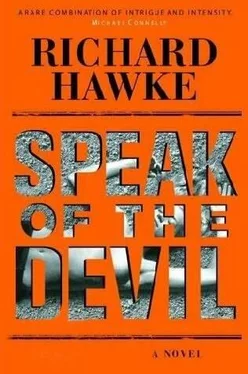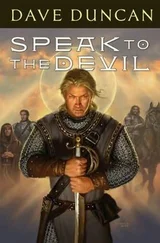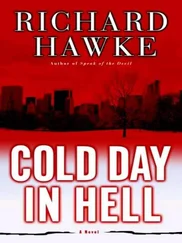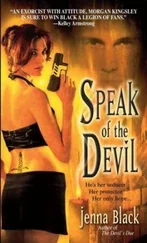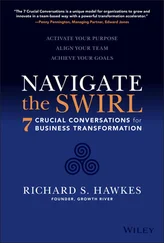And following that, at me .
The scene in front of City Hall was a regular Woodstock of media. Focus all those satellite dishes on a single spot out in the galaxy, and we probably could have initiated first contact.
The mayor was standing at the top of the stairs at City Hall. The bank of microphones in front of him looked like a muscular piece of modern sculpture. Dozens of cameras down on the sidewalk were aimed up at him. Just the way he likes it.
I voted for Martin Leavitt. It wasn’t with the utmost enthusiasm that I had flipped the lever next to his name, but he was the devil I knew, and I’d been willing to give him a go. A rigorous district attorney in Brooklyn with an impressive collection of pelts on his belt, Leavitt brought strong law-and-order muscle to the post. Those are two of my issues; I’m biased that way. His prosecutorial zeal aside, Leavitt was also one of those pretty-faced politicians whom people seem to like these days. The younger Redford would have played him in the movie. At least, this was an observation Leavitt himself had been overheard uttering soon after his reelection. Allegedly, anyway. Page Six made some hay with the comment for a few days. The Sundance Mayor. Divorced after a brief marriage during the middle of his political climb to the top, Leavitt was frequently spotted in the company of high-profile women. Scorekeepers noted that the gentleman preferred blondes, though he was not beyond the stretch over to a redhead now and again. Leavitt’s decision to have a dishy pop star sing the national anthem at his inaugural had been viewed by some as refreshing and by others as tawdry. I hadn’t really cared either way myself, except when the singer mangled the high note.
Leavitt was closing in on two years into his term, and until recently, no one could have voiced any major regrets. The city had been in a sinkhole of debt when he took over the reins from his predecessor, and by putting a systematic squeeze on each and every department, Leavitt had prompted cries of mutiny throughout the five boroughs, but he had also managed to raise the levels of efficiency in the hitherto bloated and self-serving bureaucracies that had grown way too accustomed to living fat while their constituencies chewed on bones. In other words, he was putting the financial house in order.
Unfortunately, things had become a little unraveled in the arena that was Leavitt’s strong suit. Law and order. A corruption scandal in his police department had flared up like a flash fire several months back, and with the impression that Leavitt’s primary response to the scandal had been to circle the wagons around the upper brass while feeding some street grunts to the lions, the heat had begun finding its way to City Hall. Initially, the scandal had involved a group of cops in Brooklyn’s Ninety-fifth Precinct who were being accused of, among other things, a years-long pattern of shakedowns of local drug dealers, falsifying evidence or even reselling the evidence for their own gain, swapping drugs for sex with area prostitutes and generally trampling all over the neighborhoods they were sworn to protect. When the name of a noted Brooklyn prosecutor with whom then-Brooklyn D.A. Martin Leavitt had worked closely started appearing in newspaper accounts alongside the names of some of the accused cops, voices in some of the more mad-dog corners of the city had begun calling for Leavitt’s head. Tommy Carroll’s, too, for that matter. I hadn’t seen that it would come to any of that. But then the apparent murder-suicide in early November of a pair of cops allegedly involved in the scandal had guaranteed exclamation points being slapped onto the story. The papers were calling it “The Bad Apple Scandal,” “The Rotten Apple Scandal,” etc. National press was beginning to pick up on it. A definite black eye for the Leavitt administration. Its first direct hit. And some nut opening fire on citizens during the Thanksgiving Day parade was certainly not going to help matters. The darkened skies over City Hall had abruptly grown just that much darker.
I was too far back to hear the mayor, so I stepped over cables to a Channel 4 van. The side door was open. A pair of engineers were seated on canvas stools, smoking and watching the mayor on their monitor.
“… shake the spirit of this great city. We won’t let it happen. That’s not what we’re about. I want to repeat, there is nothing to suggest that what happened this morning at the Thanksgiving Day parade was a terrorist attack. This was, it appears, a lone gunman. The gunman has been apprehended, taken into custody-”
Leavitt paused as a barrage of questions from reporters took him out midsentence. I could hear the cries both live behind me and in the news van’s speakers. Leavitt raised his hands like a man at gunpoint and rode out the cacophony.
“We don’t have that information confirmed. As you can imagine, first reports on something like this come flying in from all sorts of sources. Including you folks in the media. We do have him. That much I will confirm. As to his condition? Was he shot? All that? You’re going to have to wait-” The mayor looked directly into the cameras. “ You are going to have to wait as I am going to have to wait, so that we get one story and one story only. Perhaps Commissioner Carroll will be able to update us on all that, I don’t know. He will speak in a moment. I-”
Again the mayor was interrupted. This time the tiniest trace of a smile came over his face as he listened to the yapping.
“Have I heard from Miss Gilpin directly? No, I have not. Do I know that she is safe and unharmed? Yes, I do.”
Another barrage. Another smile. This one not quite as tiny.
“How do I know that? I’m the mayor. I know people in high places.”
One of the engineers snorted. “Dude knows Rebecca Gilpin in low places, too.”
I left the van and made my way back over to City Hall. Blue police barricades had been set up at the bottom of the steps. The reporters were calling out their questions to the mayor from behind the barricades. Commissioner Carroll stepped to the bank of microphones, which struck him near the abdomen. Behind him, whispering into Leavitt’s ear, was Philip Byron, the deputy mayor. The mayor was nodding in almost exaggerated agreement to whatever it was Byron was saying to him. He looked like a circus horse.
I worked my way forward and spotted a Times reporter I knew well enough to hail. Henry Greene. He was leaning forward on the barricade, holding a handful of papers he had rolled into a cone.
“Greene!” I called out.
The reporter turned. He waved me over. “Well, if it’s not my favorite German-Irish dick.”
“You should be careful, using that kind of language.”
He indicated the barricade. “How punk is this? Leavitt’s got us in a mosh pit.”
“You’re all animals. I don’t know why he waited so long.”
“Animals. Right.”
“So what are you hearing?” I asked. “Sound like straight dope so far?”
The reporter shrugged. “Fifty-fifty. They’re holding back on some things. They always do.”
I considered the report Margo had mentioned, that the parade shooter had been shot by the police. It’s possible that this was simply a mistake resulting from the early chaos, but my better senses told me that wasn’t the case. I should have been coming clean to the authorities that very minute in a well-lit room at a police precinct near Central Park, all the lousy coffee I could stomach, eager faces crowded around to hear my tale. Instead, I was scheduled to pop into City Hall for a hush-hush confab with the police commissioner as soon as he finished addressing the cameras. Greene was right. They were holding back. And I was one of the things they were holding.
Читать дальше
